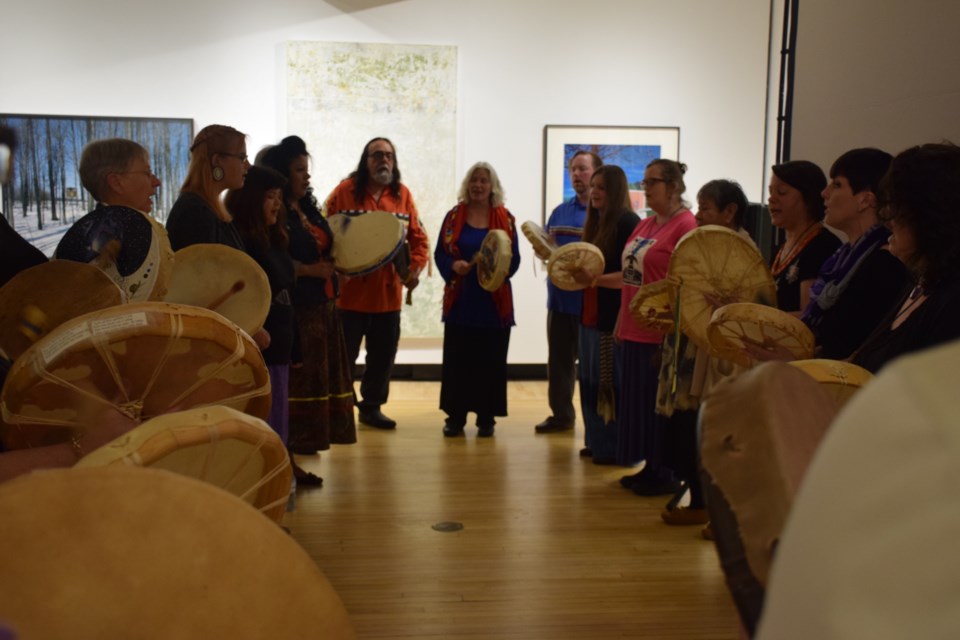A powerful new documentary film by Guelph filmmakers Vlyte Media and Ward 1 Studios is about to go national.
The 20-minute film The Journey is part of the Canadian Nurses Foundation campaign to address health care inequity in the Indigenous population. The film will be launched this week in Ottawa.
Filmmaker Alex Vander Vlugt spoke at a pre-launch screening event Friday evening at the Art Gallery of Guelph. He said that prior to starting the project, he was largely unaware of the extent of the health care inequality problem faced by First Nations in this country. Access to care is significantly lower than in mainstream society, and rates of chronic disease much higher.
The film follows the work of three young Indigenous nurses, each driven by a desire to care for their people and bridge gaps in the health care system. Their passion, strength and conviction moved many at Friday’s gathering to tears.
Vander Vlugt said the biggest shock to him was learning just how widespread the problem of health care inequality is across the country. He traveled to New Brunswick, Alberta, and northern Ontario to make the film, shot countless hours of footage, and had to borrow money to complete the documentary.
Vander Vlugt said that he, like most Canadians, have heard a lot about the northern Ontario community of Attawapiskat and its problems.
“The media coverage has been focused on this one community,” he said, but he added that Canadians largely don’t realize that the same kinds of problems are happening in communities all across the country.
“The rates of illnesses, chronic disease, and mental health issues are just that much higher,” he said.
National statistics show that chronic diseases such as diabetes and heart disease are on the rise in Indigenous communities. There is a higher rate of respiratory illness and infectious diseases among Aboriginal children than among non-Aboriginal children. Inadequate housing, crowded living conditions, low income levels and other social factors contribute to these problems.
“In the education I received in the public system, we weren’t talking about that, let alone any First Nations and Indigenous issues,” Vander Vlugt said, adding that he hopes the documentary can inspire others to educate themselves on these issues.
The film supports CNF’s One Million in One Year campaign, an effort to raise $ 1 million to provide more scholarships to Indigenous nursing students and promote advanced knowledge of indigenous health care in the country. Learn more here: http://cnf-fiic.ca/support-indigenous-nursing/.
The three women profiled in the film were trained in mainstream nursing programs, but each has taken additional training specific to Indigenous health. And each one is an outspoken advocate for Indigenous health.
Danielle Bourque is one of the three nurses in The Journey. The Alberta woman was in Guelph Friday for the screening, and will soon begin a master’s program in nursing at McMaster University in Hamilton.
She was working at Enoch Health Centre on the Enoch Cree Nation prior to moving to Ontario. She told the audience that although the community is just a few kilometers from the city limits of Edmonton, there was a daily need to test the water to ensure its safety. This was one of her duties, and is common across Alberta.
Safe, clean drinking water is lacking in First Nations everywhere across the country, Bourque and Vander Vlugt said.
“It’s pretty disgusting, and a stain on our Canadian society that we’ve let our First Nations people slip through the cracks,” the filmmaker said.
In the film, a tearful Bourque said she had a great sense of pride in advocating for the wellbeing of her people. The other young nurses, Isabelle Wallace and Sharlene Webkamigad, express their drive and passion to help people in their communities. Webkamigad is from the Wikwemikong Unceded Indian Reserve on Manitoulin Island.
Good Hearted Women, an Indigenous drumming circle and singing group from the Waterloo Region, provided much of the soundtrack for the film. Members of the large group performed stirring songs at Friday evening’s event.
The authentic sound the group contributed to the film underscores the special place songs have among Indigenous people, the gathering heard.
In the documentary, Canadian Nurses Foundation executive director Christine Rieck Buckley said the organization’s scholarship program for Indigenous nurses helps many realize their dream of becoming a nurse.
These nurses, she added, have a better understanding of the conditions of those in the Indigenous community, and are better able to serve their health care needs.
One Million in One Year launches Wednesday in Ottawa.
